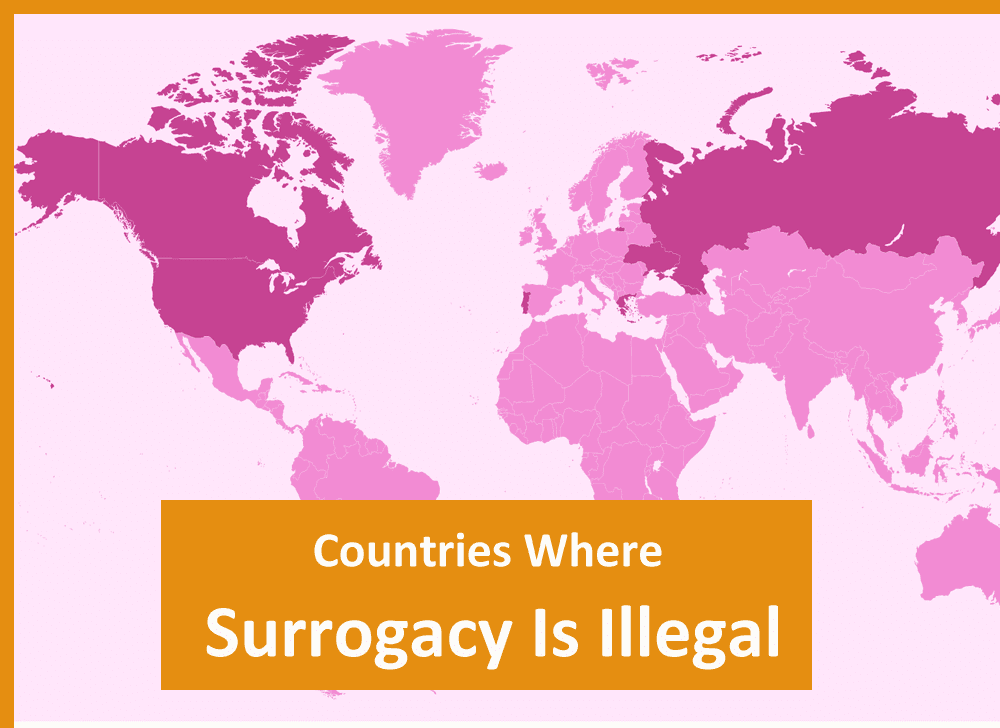Countries Where Surrogacy Is Illegal: Global Overview in 2025

When looking into surrogacy laws, it’s key to know how they affect your choices as a future parent. Laws in different places show not just legal rules but also deep debates on reproductive rights and family building. In many countries where surrogacy is prohibited, you must think about where it’s legal and how laws affect your path to parenthood.
Surrogacy laws vary worldwide, with some countries completely banning all forms of surrogacy while others allow only altruistic surrogacy. Nations that prohibit surrogacy often cite ethical, religious, and legal concerns. This guide outlines countries where surrogacy is illegal, the reasons behind bans, and alternative destinations for intended parents.
Key Takeaways
- Surrogacy laws vary significantly across the globe, with some countries enforcing complete bans.
- Understanding international laws is crucial for intended parents seeking surrogacy arrangements.
- Legislation often reflects deeper ethical and cultural values concerning family and reproductive rights.
- The U.S. is highlighted for its favourable and well-regulated surrogacy environment.
- Commercial surrogacy is banned in most of Europe, including France, Germany, and Spain.
- Only altruistic surrogacy is allowed in Canada, the UK, and Australia.
- Countries like India & Thailand have banned surrogacy for foreigners.
- Intended parents must research legal protections before choosing a destination.
Table with information on countries and their surrogacy laws:
| Country | Commercial Surrogacy | Altruistic Surrogacy | Surrogacy Status |
| Australia | Prohibited | Allowed | Altruistic surrogacy is legal in all jurisdictions. Commercial surrogacy is a criminal offense. |
| Canada | Banned | Allowed | Only altruistic surrogacy is permitted. Compensation for gestational carriers is limited to approved expenses. |
| Colombia | Uncertain | Allowed | There are no clear rules, but altruistic surrogacy is performed and well tolerated. |
| Greece | Banned | Allowed | Heterosexual couples, single females allowed. |
| India | Prohibited | Allowed | Altruistic surrogacy is permitted for certain couples based on medical and age criteria. |
| Israel | Allowed | Allowed | Gestational surrogacy is legal under the Embryo Carrying Agreements Law. |
| Kenya | N/A | N/A | No legal regulations/laws for surrogacy in Kenya. |
| Mexico | Allowed | N/A | Surrogacy, along with ovum and sperm donation, has been legal since 1992. |
| New Zealand | N/A | Allowed | Altruistic surrogacy is legal. |
| Thailand | Banned | N/A | Commercial surrogacy is criminalized under the Medical Council Act. |
| Ukraine | Allowed | Allowed | Surrogacy and egg/sperm donation are legal and supported by liberal laws. |
| United Kingdom | N/A | Allowed | Surrogacy laws vary across different states/territories in the UK. |
| United States | Varies by state | Allowed | Surrogacy laws vary by state, some are surrogacy-friendly, while others restrict or penalize commercial surrogacy. |
How to Choose a Surrogacy-Friendly Country?
✅ Check Legal Protections – Ensure intended parents’ rights are fully secured.
✅ Consider Costs & Medical Standards – Budget-friendly options may lack strong medical or legal support.
✅ Review Parental Rights & Citizenship Issues – Some countries require court approvals for legal parentage.
✅ Work with an Experienced Surrogacy Lawyer – Navigating cross-border surrogacy requires legal expertise.
Get in touch for a Free Surrogacy Consultancy:
📲 +91-8800481100 ( WhatsApp, Line, Viber)
Related surrogacy Costs guides:
What is the average surrogacy cost?
How much does surrogacy cost in Ukraine?
How much does surrogacy cost in Georgia?
How much does surrogacy cost in India?
What is the Surrogacy Cost in Colombia?
What is the Surrogacy cost in Mexico?
What is the surrogacy cost with family members?

Understanding Surrogacy and Global Legislation
Surrogacy is when a woman carries a child for others, often through IVF. The definition of surrogacy changes based on where you are. Knowing the surrogacy legalities worldwide is key for those thinking about it.
Definition of Surrogacy
Surrogacy can be traditional or gestational. Traditional uses the surrogate’s egg, while gestational uses an egg from the intended mother or a donor. Each type has its own legal and emotional aspects.
The Importance of Legal Frameworks
Having clear surrogacy legislation is crucial. Laws on surrogacy vary by country, affecting your plans. In the U.S., laws differ by state, offering a range of options. Ukraine allows paid surrogacy but has rules, like being married.
In places like Nigeria, Malaysia, and Kenya, there are no laws, but surrogacy is allowed. It’s wise to work with lawyers to follow gestational surrogacy regulations.
Countries with strict rules often limit who can use surrogacy. Knowing the laws helps you understand what’s possible and what’s not.
| Country | Surrogacy Type | Legal Status | Key Details |
| United States | Gestational | Legal | Varies by state, with well-regulated processes. |
| Ukraine | Compensated | Legal | Limited to married heterosexual couples. |
| Nigeria | Commercial | No formal laws | Lax regulations, potential risks involved. |
| Mexico | Commercial | Legal | Appeals to various types of intended parents. |
| Germany | None | Illegal | All surrogacy arrangements are banned. |
| Canada | Altruistic | Legal | Agency restrictions loosely enforced. |
Countries Prohibiting Surrogacy Arrangements
Countries around the world have different rules on surrogacy restrictions by country. Some ban surrogacy altogether. This shows how complex laws, ethics, and social views can be. Countries like France and Germany ban all surrogacy. Others allow it but with strict rules.
Overview of Global Surrogacy Bans
Many countries ban both commercial and altruistic surrogacy. They do this because of ethical worries. In the European Union, places like Italy, Spain, and Portugal have laws that limit or control surrogacy.
The U.S. is one of the few places where commercial surrogacy is allowed. But, the rules can change a lot from state to state.
Why Do Some Countries Ban Surrogacy?
🔴 Ethical Concerns – Many governments believe commercial surrogacy can lead to exploitation of women.
🔴 Religious & Cultural Beliefs – Some nations oppose surrogacy based on moral values and family structures.
🔴 Legal Complications – Citizenship, parental rights, and cross-border legal conflicts make surrogacy risky.

Reasons Behind Surrogacy Bans
These bans often come from worries about treating motherhood like a business. They also want to protect women and children. People who support these bans say surrogacy can lead to exploitation, especially in poor countries.
They worry about secret or illegal surrogacy in places with strict rules. This makes it important to have clear laws.
In Which Countries Surrogacy Is Illegal
Knowing the laws about surrogacy around the world is key. Some countries ban surrogacy completely, while others only allow it for free. This part talks about places where surrogacy is banned or very restricted.
Countries Where Surrogacy is Completely Illegal
| Country | Commercial Surrogacy | Altruistic Surrogacy | Legal Status |
|---|---|---|---|
| France | ❌ Banned | ❌ Banned | No surrogacy allowed |
| Germany | ❌ Banned | ❌ Banned | Surrogacy contracts are unenforceable |
| Spain | ❌ Banned | ❌ Banned | Parents must adopt the child |
| Italy | ❌ Banned | ❌ Banned | Strict surrogacy laws |
| Sweden | ❌ Banned | ❌ Banned | Surrogacy agreements are void |
🔹 Countries in the European Union generally prohibit commercial surrogacy due to ethical concerns.
Countries with Comprehensive Bans
Some countries have strict rules against surrogacy. Finland, France, and Germany are examples. They don’t allow any kind of surrogacy, making them among the countries where it’s banned.
The commercial surrogacy ban in these places shows a strong stance on reproductive rights. It’s about not making money from human life.
| Country | Eligibility for Surrogacy | Types of Surrogacy Allowed | Legal Protection for Intended Parents | Accessibility for Foreigners | Advertising for Surrogates |
| Australia | Altruistic surrogacy only | No donor or surrogate matching | Not applicable | Not applicable | Not legal |
| Canada | Altruistic surrogacy only | Not applicable | Not applicable | Altruistic surrogacy allowed | Not applicable |
| Greece | Heterosexual couples, single females | Not applicable | Not applicable | Foreign nationals allowed | Not applicable |
| Georgia | Heterosexual couples (including foreigners) | Compensated surrogacy | Well protected | Foreigners allowed | Not applicable |
| Ukraine | Heterosexual couples (including foreigners) | Compensated surrogacy | Well protected | Foreigners allowed | Not applicable |
| India | Indian citizens only | Commercial surrogacy allowed | Not applicable | Not applicable | Not applicable |
| Israel | Heterosexual Israeli citizens | Altruistic surrogacy only | Not applicable | Not applicable | Not applicable |
| Kenya | Locals and foreigners | Compensated surrogacy | Not legally protected | Not applicable | Not applicable |
| Laos | Foreigners only | Compensated surrogacy | Not legally protected | Foreigners allowed | Not applicable |
| Nigeria | Heterosexual Nigerian citizens | Altruistic and commercial surrogacy | Not applicable | Not applicable | Not applicable |
| South Africa | Heterosexual South African residents | Altruistic surrogacy | Not applicable | Not applicable | Not applicable |
| Thailand | Heterosexual Thai couples | Altruistic surrogacy only | Not applicable | Not applicable | Not applicable |
| UK | Not applicable | Altruistic surrogacy only | Not applicable | Foreigners cannot access | Not legal |
| USA | Gay and heterosexual foreigners | All forms of surrogacy | Well regulated | Foreigners allowed | Not applicable |
Countries with Limited Surrogacy Options
Other countries allow surrogacy but only for free. Brazil, Canada, and Australia are examples. In Brazil, while commercial surrogacy is banned, free surrogacy is allowed. But, illegal practices still happen.
Canada allows free surrogacy, letting parents cover costs but not pay extra. Colombia doesn’t have clear laws, making it hard for parents to get their children recognized.
When choosing, knowing where surrogacy is banned is crucial. It helps you pick the right country. The laws vary, from total bans to limited options. This gives both challenges and chances for those wanting to have a child through surrogacy.
Countries That Allow Only Altruistic Surrogacy
Some countries allow unpaid surrogacy, where surrogates receive only medical and pregnancy-related expenses.
| Country | Legal Status |
| United Kingdom | Only altruistic surrogacy is permitted. Commercial agreements are unenforceable. |
| Canada | Surrogates can only be compensated for medical and pregnancy-related expenses. |
| Australia | Commercial surrogacy is illegal, but altruistic surrogacy is allowed in most states. |
| Brazil | Only unpaid surrogacy is allowed. Laws are unclear for foreigners. |
| New Zealand | Altruistic surrogacy is legal, but requires ethics committee approval. |
🔹 Even in altruistic surrogacy-friendly countries, legal processes for parental rights can be complex.

Best legal countries for surrogacy
Choosing the right country for surrogacy means looking at laws and costs. Many parents look at countries with clear rules and affordable prices.
Alternative Countries for Surrogacy
| Country | Cost (USD) | Surrogacy Type | LGBTQ+ Friendly? |
| USA | $150,000+ | Commercial | ✅ Yes |
| Georgia | $50,000 – $75,000 | Commercial | ❌ No (Hetero couples only) |
| Ukraine | $45,000 – $70,000 | Commercial | ❌ No (Hetero couples only) |
| Colombia | $60,000 – $80,000 | Altruistic & Commercial | ✅ Yes |
| Mexico | $60,000 – $80,000 | State-dependent | ✅ Some states |
🔹 Countries like Colombia and Mexico provide lower-cost alternatives to the USA.
Here’s a look at some top countries for surrogacy, focusing on cost and legal safety.
Surrogacy in Mexico
Mexico is great for surrogacy, especially in Tabasco and Sinaloa. These places have clear rules. The cost is about $35,000 to $60,000, covering medical, legal, and surrogate pay. Mexico is appealing because it’s legal and not too pricey.
Surrogacy in Argentina
Argentina supports surrogacy, especially for altruistic reasons. The cost is around $70,000, covering medical and legal needs. It’s a bit pricier than some places but is safe for parents and LGBTQ+ couples.
Surrogacy in Colombia
Colombia is a good choice for surrogacy, costing about $70,000. This includes medical and surrogate pay. It welcomes all couples, including LGBTQ+, and offers a guaranteed baby plan.
Surrogacy in Georgia
Georgia is one of the cheapest options, costing $30,000 to $60,000. This includes medical and legal help. It’s affordable but remember, legal changes might affect plans by January 2024.
Surrogacy in Ukraine
Ukraine is a top pick for surrogacy, costing $40,000 to $65,000. It allows commercial surrogacy and offers full medical and legal support. It’s also quick to process, making it very appealing.
| Country | Surrogacy Cost (approx.) | Legal Status |
| Mexico | $35,000 – $60,000 | Legal, varies by state |
| Argentina | $70,000 | Altruistic surrogacy legal |
| Colombia | $70,000 | Altruistic surrogacy legal, inclusive of LGBTQ+ |
| Georgia | $30,000 – $60,000 | Legal, but changing regulations |
| Ukraine | $40,000 – $65,000 | Legal, commercial surrogacy |
These countries offer different costs and legal protections. It’s important to keep up with legal changes and costs when picking the best country for surrogacy.
 Conclusion
Conclusion
Understanding surrogacy laws around the world is key for those thinking about it. Laws on surrogacy differ a lot from country to country. For example, India, Ukraine, and California allow commercial surrogacy, but places like England and Germany have strict rules.
This shows how important it is to know whether surrogacy is allowed or not. This method affects those who want to become parents.
Final Thoughts: Understanding Global Surrogacy Laws
Surrogacy bans reflect cultural, legal, and ethical concerns in many countries. However, some nations offer safe and regulated options for intended parents. The key is finding a legally secure, ethical, and financially viable destination that aligns with your needs.
📌 Need Expert Guidance on Surrogacy Laws? 📩 Get a free consultation with a surrogacy expert today!
🌍 Website: www.ivfconceptions.com
📧 Email: neelam@ivfconceptions.com
📲 WhatsApp/Viber/Line: +91-8800481100

FAQs for countries where surrogacy is illegal
In which countries is surrogacy illegal?
Surrogacy is banned in countries like France, Germany, Finland, and Portugal. They prohibit all forms of surrogacy arrangements.
What are some countries that allow only altruistic surrogacy?
Countries like Canada and Brazil only allow altruistic surrogacy. This means the surrogate gets no payment, only medical expenses.
What are the common motivations behind surrogacy bans?
Bans on surrogacy often stem from ethical worries. People are concerned about treating motherhood as a commodity. They also want to safeguard women’s and children’s rights.
Are there countries with ambiguous surrogacy laws?
Yes, countries like Colombia have unclear laws on surrogacy. This leaves intended parents unsure about their rights and options.
Which countries are considered the best for surrogacy?
Mexico and Ukraine are seen as good choices. They offer comprehensive and affordable surrogacy options. They also protect the rights of both intended parents and surrogates.
What should intended parents consider when navigating international surrogacy?
Intended parents should do their homework on surrogacy laws. They need to understand the legal aspects. It’s wise to talk to legal experts to ensure everything is done right and everyone’s well-being is considered.
What is the difference between commercial and altruistic surrogacy?
Commercial surrogacy pays the surrogate more than just medical costs. Altruistic surrogacy only covers medical expenses without extra payment.
How do surrogacy laws differ by country?
Laws on surrogacy vary a lot. Some countries have detailed rules, while others have strict bans or only allow certain practices. This affects the options for international surrogacy.
Source Links
- https://en.wikipedia.org/wiki/Surrogacy_laws_by_country – Surrogacy laws by country
- https://surrogate.com/intended-parents/surrogacy-laws-and-legal-information/what-are-the-international-surrogacy-laws-by-country/ – International Surrogacy Laws by Country | Surrogate.com
- https://www.bbc.com/news/world-28679020 – Surrogate babies: Where can you have them, and is it legal?
- https://www.americansurrogacy.com/parents/surrogacy-laws-by-country – Surrogacy Laws by Country – American Surrogacy
- https://surrogacy360.org/considering-surrogacy/current-law/ – Current Law
- https://www.ncbi.nlm.nih.gov/pmc/articles/PMC7827900/ – Surrogacy and “Procreative Tourism”. What Does the Future Hold from the Ethical and Legal Perspectives?
- https://blog.petrieflom.law.harvard.edu/2024/03/18/regulating-international-commercial-surrogacy/ – Regulating International Commercial Surrogacy – Bill of Health
- https://www.ivfconceptions.com/countries-where-surrogacy-is-legal/ – Countries where surrogacy is legal (International Surrogacy 2024)

 Conclusion
Conclusion